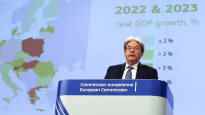Inflation is predicted to be record high this year. The weak outlook is explained by Russia’s war of aggression in Ukraine.
The European Commission predicts that the economic growth of the euro area will be 2.6 percent this year and 1.4 percent next year. The estimate has decreased from the spring forecast.
In May, the Commission expected that the euro area would have grown by 2.7 percent this year, while at the beginning of the year the estimate was 4 percent. Growth is slowing down, but according to the commission, there is no recession in sight.
The Finnish economy is estimated to grow by 1.8 percent this year and 1.2 percent next year. The estimate of this year’s growth has improved slightly, as in May the commission predicted a 1.6 percent growth in Finland. The outlook for next year has weakened, because in its previous forecast, the commission predicted Finland’s growth of 1.7 percent for 2023.
Finland’s growth is largely based on domestic demand. However, the Commission estimates that the growth of private consumption will slow down in Finland. On the other hand, at the same time, exports are expected to gradually pick up.
Finland’s employment situation has remained strong and it is also expected to remain good in the near future.
Average annual inflation is predicted to be record high this year: 7.6 percent in the euro area and 8.3 percent in the EU as a whole. Next year, the situation is expected to ease and inflation to slow down steadily in the euro area.
Lots of uncertainties
According to the Commission, the weaker economic growth and faster inflation than previously estimated is explained in particular by Russia’s war of aggression in Ukraine and its negative effects on the EU economy.
The war has increased the prices of energy and food, which again tests the purchasing power of households. Finance Commissioner Paolo Gentiloni stated at his press conference that this time there are many uncertainties associated with the economic forecast.
– The course of the war and the reliability of gas supplies are shrouded in darkness, so this forecast involves a large number of uncertainties and negative risks, Gentiloni said.
According to the commission, new possible increases in the price of gas can further accelerate inflation and stifle growth.
Economic growth in Europe is also being slowed down by the effects of China’s strict corona policy and weakened growth in the United States. According to the commission, new disruptions possibly caused by the pandemic cannot be excluded from the invoices yet.
